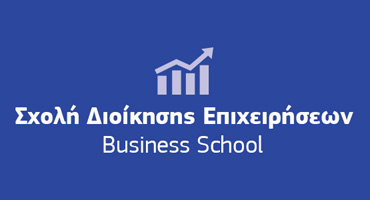

Business School
- BA (Hons) Marketing, PR & Advertising
- BSc (Hons) Economics & Finance
- BA (Hons) Business Management (Marketing)
- BA (Hons) Business Management (Finance)
- BA (Hons) Business Management
- BA (Hons) Business Management (Human Resource Management)
- BA (Hons) Business Management (Supply Chain & Logistics)




BA (Hons) Business Management
-
No1 in Greece | TOP10 in the UK.
-
CMI accreditation (Chartered Management Institute).
-
4 available pathways
-
Links with 120+ businesses

Course Information
The Mediterranean College Business School is one of the first Business Schools to be established in Greece (1977) and the first to offer an MBA, back in 1989. The BA (Hons) Business Management has been designed by the University of Derby, a TOP10 UK University for Management studies, according to the Guardian University Guide, 2020.
Developed in close consultation with the premier UK professional body for managers, the Chartered Management Institute (CMI), this course puts you on the fast track to success. It is one of the few where you’ll graduate with a highly regarded BA (Hons) Business Management as well as the CMI Level 5 Diploma in Management and Leadership. With these qualifications on your CV, you’ll signal to prospective employers that you’re suited for senior leadership roles and rapid promotion. The Diploma is the benchmark qualification for full CMI membership and takes you a step towards Chartered Manager status. There is no need to take extra exams or coursework to achieve the Diploma: our combined module and CMI assessments give you a smooth route to both qualifications.
What you will study
All Business Management students study the same modules in the first year, so you’ll gain insights into the major business disciplines. After your first year, you can choose to transfer to one of our specialist pathways, combining Business Management with Marketing, Finance or Shipping.
Through this course you’ll develop your understanding of the external economic & business environment, by discussing recent and relevant case studies. We put emphasis on entrepreneurship so that you’ll know how to start your own business or how to expend it internationally. Up to date digital marketing skills will make you productive from the start of your career, while business ethics will direct your business practice.
We take a ‘scaffolded’ approach to learning, so you’ll have full support in the early stages of your course and can gradually move towards stronger understanding and greater independence. It’s a smooth transition to ease your way into both university-level study and business management practice.
Why choose this course
- The degree is awarded by the TOP ranked UK University in Greece and TOP10 in the UK.
- It is CMI accredited, so you’ll earn the CMI Level 5 Diploma in Management & Leadership.
- You can change pathway in your 2nd year: Marketing, Finance or Shipping.
- You can participate in a student exchange week at the University of Derby.
- You are taught applied content in sought-after areas: international business development, entrepreneurship, digital & social media.
- You get familiar with all business functions, through our business simulation lab and the SimVenture awarded software
- You undertake a live consultancy project in one of our partner businesses.
- You become a bilingual business executive, with exceptional academic and career prospects.
You’ll learn through lectures – some by guest lecturers, seminars, one-to-one or small group tutorials and self-directed study. You’ll take the theories off the page and put them into practice in real-world scenarios. You can test your ideas through business simulations, topical case studies and employer-led projects. A live consultancy project, where you help an employer to improve business performance, will build your research, project management, problem-solving and decision-making skills.
Assessment is mainly via coursework which can take forms such as, essays and report, group project work, research and consultancy projects, presentations, posters, design of digital materials, in-class tests, computer-based assessments.
Courses
Year 1
Understanding People in Organisations
This module introduces Organisational Behaviour (OB) theory and research to help students gain an understanding of the range of individual, group and organisational factors which can influence the way that employees behave in the workplace. Students will practice applying the theory to case study organisations to explore how it can be used as an analytical tool to gain a clearer understanding of the complex causes of workplace behaviour to develop effective management interventions.
Business Economics
Economics is all around us, present in almost every aspect of our lives. Knowledge of economics will therefore provide you with an essential insight into how markets work and how firms and consumers make decisions in market economies. Knowledge of economics is important to businesses as it helps them identify opportunities and potential threats, they may face in the environment they operate. Therefore, this module aims to develop your understanding of the core principles of micro and macro-economics. You will use economic models, theories and ideas to investigate current economic issues. The module will help you develop your understanding of economic information and will enable you to develop your ability and confidence to create your own independent thoughts around current economic issues.
Developing the Enterprising Mindset
Being able to apply an enterprising mindset is highly desirable in today’s fast moving business environment were reacting to gaps in the market or competitor actions, dealing with uncertainty, being able to make decisions and take action will all extend your commercial awareness and business acumen. Therefore, this module is all about developing your enterprising mindset and then applying it in a real-life situation. Building on and integrating the other first year business function modules, this module will overlay elements such as funnelling your creative energy, recognising the difference between a business idea and a business opportunity, deciding which approach is most beneficial, and then designing and implementing an appropriate plan of action.
The aim of the module to help you understand the relevance and interaction of these elements within a business context, and to give you transferable skills you can apply in any organisational situation. Moreover, strong emphasis will be placed upon you to demonstrate these skills and to reflect upon your progress.
Financial and Business Performance
This module will assume no prior accounting knowledge. You will learn how to prepare accounts for small businesses and then apply that knowledge to larger organisations. Numbers by themselves can be misleading and you will progress to examining accounting statements to assess just how well a business is performing. Managers cannot improve the performance of a business unless they make correct interpretations of situations and learn how to diagnose problems.
Business costs will be identified and analysed to aid decision making relating to the control and viability of projects. Sources of finance will be identified and discussed.
This basic financial knowledge is essential to anyone wishing to pursue a career in business, whether on a self-employed basis or in a larger corporation.
Marketing Fundamentals
This introduction to the “fundamentals of marketing” module will provide you with a basic understanding of the current and emerging marketing principles and techniques within the business environment. It seeks to establish that sustainable market success within a highly competitive environment can only be achieved by developing products or services based upon an understanding of the external environment and customers’ needs and wants.During the module you will not only consider how to add value for customers and other stakeholders but also learn to assess the impact that marketing activities have on consumers’ lives.
Your assessment is coursework-based, designed to enable you to demonstrate your ability to approach a business challenge as a marketer and business manager. The assessment methods used on this module will also help you develop key skills desired by employers, for example digital and visual communication and presentation skills, and business report writing. This module also contributes to achieving your Chartered Management Institute (CMI) level 5 Diploma under the dual accreditation arrangement. Enhanced employability is just one widely recognised outcome of membership of the CMI.
Operations, Supply Chain & IT
The module provides a framework, to understand the crucial role of operations, supply chain and IT to business success. This module will provide an understanding of the systems and processes whereby, people, capital, materials, equipment, knowledge, technology, information, and time are combined to produce goods and services. It provides an overview of the key areas of operations management, supply chain management and information technology particularly in maintaining and improving the quality of goods and services and making sure that this is also reflected in the organisation’s performance. The modern organisation cannot stand still, business operations need to be constantly evaluated and improved, against the standards expected in a changing marketplace.
Academic Skills
In this year-through module students will learn how to develop essential academic skills in order to succeed with coursework, navigate online platforms, deliver oral presentations, use Microsoft tools and other ICT, excel in academic writing, referencing and research.
English I
Students will develop their general English skills in reading, writing, listening and speaking, and be provided with an introduction to academic English. Students will develop their grammatical, phonological and general and Business and Shipping specific lexical awareness. By the end of the module students’ language for academic study should be at a mid B2 on the CEFR equivalent to IELTS 5.5.
Year 2
Quantitative Skills for Business
This module develops key skills for your future employment in business - the ability to use spread sheets for quantitative analysis, and the skills to interpret and communicate the results of data analysis. These are key skills required by the Chartered Management Institute. The skill base developed gives you the confidence and experience to prepare an analysis of real data to inform a business decision or underpin a business strategy. These skills also prepare you for evidenced based analysis required in other modules within your programme including finance, marketing and strategy.
Sustainability and Responsible Management
This module aims to provide you with knowledge of the responsible management including exploring concepts of ethics, leadership, global social responsibility, and creation of sustainable social, environmental and economic value for organisations and corporations utilising the UN’s 17 Sustainable Development Goals (SDGs).
The module will also encourage you to consider the importance of these issues from both the organisation’s and other stakeholder perspectives. You will also reflect on the relevance of responsible management and leadership as a basis for sustainable competitive advantage. The module aims to equip you with the knowledge and understanding of the complex ethical issues that are encountered by organisations on a frequent basis when trying to achieve these goals.
Applied Operations Management
The modern business environment is highly volatile and intensely competitive, and is likely to remain so for the foreseeable future. The role of the operations function; how the organisation actually sources, produces and delivers goods and services to demanding customers, becomes a key contributor to superior performance and customer satisfaction.
The module provides a framework, to understand the crucial role of operations to business success. It provides an understanding of the systems and processes whereby, people, capital, materials, equipment, knowledge, technology, information and time are combined to produce goods and services. This module will also provide students with opportunities to experience real workplace operations scenarios where their skills and knowledge can be applied in a practical way with real organisations or in valid case study situations.
It provides an overview of the key areas of operations management, particularly in maintaining and improving the quality of goods and services and making sure that this is also reflected in the organisations performance. The modern organisation cannot stand still, performance needs to be constantly evaluated and improved, against the standards expected in a changing marketplace.
Managing Performance through People
This module analyses the range of human resource management (HRM) activities undertaken within organisations to manage the performance of its employees working alone and in teams and explores the devolution of many of these roles and responsibilities to line managers. It provides an introduction to the knowledge and skills required to undertake these activities professionally and effectively in the workplace. By the end of the module students will be able to conduct an effective performance review and link the outcomes from this into appropriate performance objectives and support frameworks and plans. They will analyse their own HRM skills and construct a plan to manage their continual professional development in relation to these beyond the module.
Managing Financial Resources
This module will equip you with the skills needed to evaluate the financial data used to produce company financial statements. You will learn the importance of choosing the correct form of finance for a given business. You will gain an appreciation of the value of corporate governance and the responsibility of good managers to wider stakeholders in the business. Without good management control and coordination of financial resources, businesses frequently fail to meet their potential.
You will study common pitfalls in performance management and how to avoid them. This module will equip you with key skills, such as the ability to understand, analyse and interpret financial, management and non-financial information in the context of modern business. Such skills are vital to any business manager, irrespective of discipline.
Digital and Social Media
The Digital and Social Media module examines the potential marketing applications of the Internet and related digital technologies and their implications to marketing strategy, research and tactics. The fundamental aim of marketing is to create value to the consumer, thereby creating satisfaction and loyalty. This fundamental principle applies whether you are marketing online or offline. Digital marketing and social media, however, poses a new array of opportunities and challenges to marketers who need to understand these new concepts, tools, technologies and business models.
The aim of this module is to provide you with knowledge of practical frameworks and tools that can be applied in the real world and to understand how different types of business employ these digital and social media mix effectively to improve performance / achieve competitive advantage. The module is contemporary and will explore examples of best practice from organisations in the private sector (corporate to small / medium size business and from the public / not for profit sector. The module is informed by external practitioners / consultants and supported by a series of guest lectures, who advise and support the teaching ream on the content of the module and best practice examples.
English II
The module builds on English I and further develops students’ general and academic English skills in reading, writing, listening and speaking. Students will be exposed to more advanced forms of academic English. Students will further develop their grammatical, phonological and general and Business and Shipping specific lexical awareness. By the end of the module students’ language for academic study should be at a B2/B2+ on the CEFR equivalent to IELTS 6.0 or above.
Year 3
The Business Consultancy Project
Improvements to processes, services, products, people, and systems are core to the strategy of organisations. Improvements bridge the gap between current and required performance to add value and achieve and sustain a competitive advantage in the long-term.
Effective consultation and project management using appropriate business improvement and research methodologies is key to the successful implementation of change. In this module students will explore how to plan, organise, motivate, and control resources to achieve defined goals, on time and to agreed cost and quality criteria.
Using a consultative approach, students will be challenged to make decisions based on their own research to provide practical advice and solutions to real-life scenarios taking into consideration the organisations constraints. They will liaise with employers, establish agreed objectives and present their findings in a clear, business focused report and presentation.
Global Business and Strategy
This module studies the global business using a combined strategic and economic approach. As part of this module, you will explore the recent major global economic shifts and analyse current international business events. You will study the key theoretical underpinnings, trends and challenges of international trade and foreign direct investment. You will analyse the importance of government and institutions in controlling/regulating international business behaviour. This will allow you to consider the long-term sustainability of businesses in the ever-changing, and often hostile, global business environment and help you understand the critical role played by strategic management. You will learn how to weigh up a range of complex issues like culture, leadership, corporate governance and others when developing a strategy for an international business.
Throughout this module, you will develop critical practical skills valued by employers and professional accreditation bodies. These include selecting and interpreting data, problem-solving and decision-making, positioning analysis, and developing and evaluating strategic options. Such skills are vital for successful careers in a variety of international and domestic organisations.
Developing Leadership and Management
This module is about the concepts of Leadership and Management. It explores the similarities and differences in the roles and responsibilities of leaders and managers in the workplace and the development of leadership theoretical approaches as well as the practical application of these within organisations. Students will analyse the skills and competencies of effective organisational leaders and examine alternative methods of leadership development to enhance these.
Marketing Across Cultures
Organisations in all sectors and industries face increasing international competition. This can be from multi-nationals, from competitors establishing themselves in their domestic environment, the need for foreign suppliers or indeed when they seek to establish operations abroad. As a student of Marketing and future Marketing professional, you must therefore have a thorough understanding of the added complexities involved and how these impacts on the formulation of marketing plans and strategies.
This module seeks to build on the knowledge and concepts you will have encountered at earlier stages of the course. It aims to familiarise you with a range of issues and concepts encountered by international marketers and to provide the theoretical framework that will enable you to analyse and implement these in a real-life business situation.
Your assessment is coursework-based, designed to enable you to demonstrate your ability to approach a business challenge as a marketer and business manager. The assessment methods used on this module will also help you develop key skills desired by employers, for example critical analysis, business report writing and presentation skills.
International Entrepreneurship
This module seeks to develop your understanding of the emerging area of International Entrepreneurship and how you can apply that knowledge in a real-life situation.
In recent years, international business and entrepreneurship have been coalescing into a single cognate area that is now becoming regarded as cohesive. Trading blocs such as the EU have placed emphasis on entrepreneurship as an engine of economic growth and the trend towards greater international involvement of SMEs is accelerated by technological advances. At the same time globalisation has prompted the re-emergence of local cultures which influence the growth of entrepreneurship in diverse ways. We can therefore see a tension between the global and local elements. Creating an in-depth appreciation of these elements will enable you to apply theory to inform, evaluate and enhance potential international entrepreneurial ventures. Ultimately all organisations need to be aware of the development of international business and that they can no longer rely simply on national trade.
The purpose of this module is therefore for you to explore entrepreneurial activity across boundaries paying attention to cultural and political differences, choice of markets, supply chain relations and appropriate marketing implementation. You will apply your learning to a local SME to produce an international market entry strategy and critically evaluate the process you have undertaken.
Admission Requirements
This course is right for you, if you are a high school graduate of any discipline with the necessary English language skills, who aspires to build a career in Business or start your own company.
The minimum English language requirement for the bilingual course (Greek and English) is equivalent to IELTS 4.5 (B1) and for the English-taught course is equivalent to IELTS 6.0 (B2). If you do not possess an official English language certificate, you can sit the College’s internal placement test.
Moreover, you’ll be asked to submit a reference letter from a tutor, and you’ll be called for an academic interview with the programme leader.
If you are a holder of an IEK/ HND diploma or a University or College student in a relevant discipline, you may be granted advanced entry, through recognition of prior learning.
Application & Enrolment
We use a rolling admissions policy, so we accept applications throughout the calendar year until all available places are filled. Since this is one of the most popular courses at Mediterranean College, we urge you to submit your application in time.
We also offer multiple fee payment methods, individual payment plans and bursaries based on academic, athletic and socio-economic criteria.
Contact us today and find out more about this course and the available bursaries and funding opportunities. Our admissions advisors will provide you with all necessary information and will guide you though the application and enrolment process.
Degree recognition
Your degree is recognised in Greece as professionally equivalent to degrees awarded by Greek state universities. It is also recognized by the UK NARIC as academic and professionally equivalent to any UK degree.
Click here for more information on the degree recognition procedure by Greek authorities.
Postgraduate study
A business degree allows you to choose among a great variety of postgraduate or professional courses. At Mediterranean College you can study towards:
- ΜΒΑ Global
- MBA Global Finance
- MBA Global Shipping
- MSc Marketing Management
- MSc International Hospitality Management
- MSc Big Data Analytics
Alternatively, you can opt for an accredited CPD course at Mediterranean Professional Studies:
- Leadership & Human Resources Management
- Marketing & Sales Management
- Finance for Small & Medium Businesses
- Digital & Social Media
- Shipping Management
- Global Operations & Logistics
- Hotel & Tourism Management
- Healthcare Management
- Sports Management
Career prospects
As a business graduate who can build your career in any business environment or develop your own business in Greece or abroad. You can secure positions in:
- Multinational companies
- Industrial production companies
- Professional services (technology, consultancy, etc)
- Tourism & hospitality enterprises
- Banks & other financial services
- Retail & other commercial businesses
- Media and communications agencies
- Shipping companies
- Hospitals & other health services
- Educational organisations
- Non-governmental organisations
Testimonials
Studying at the MSc Marketing Management was a unique experience. I really enjoyed lectures and exchange of ideas in the class. I have developed skills in communication and team working and enhanced my research and analytical skills. Today, I feel very grateful to my professors and more confident for acquiring such important knowledge....
Antigoni Filipidou, MSc Marketing Management
My studies at Mediterranean College were the most creative and enjoyable period of my life, helped me to develop the elements of my personality. The conclusion; Never stop following your dreams....
Eleni Stamatiou, BA (Hons) Business (Marketing)
The MBA allowed me to acquire a lot of new knowledge, essential for my professional career. A great thanks to both my family for their support and professors for being such inspiring and supportive....
Dimitrios Orfanoudakis, MBA




